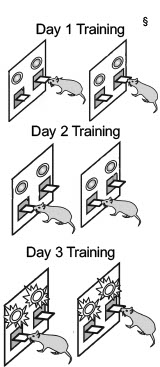CURRENT RESEARCH PROJECTS
- Examining how stress affects cognitive function (Rodent Studies)
Stressful life events can impair cognitive function, precipitating or exacerbating many psychiatric disorders. Whether stress impairs cognitive function depends on several factors, including the 1) type, intensity, and duration of the stressor; 2) timing of the stressor in relation to learning or executing the cognitive task and 3) individual differences in the subject being exposed to stress. Interestingly, stress-related psychiatric disorders such as Major Depressive Disorder (MDD) and Post-Traumatic Stress Disorder (PTSD), of which cognitive impairment is a key phenotype, are twice as common in women. Yet, there has been limited research directly examining individual differences in how stress affects cognitive function. I am specifically interested in how stress affects cognitive flexibility, which is the ability to adapt cognitive processing strategies to face new conditions in the environment, and it is crucial for normal daily functioning. My research aims to better understand individual differences in how stress affects cognitive flexibility and to determine biological substrates that underlie the differences observed.
- Investigating how stress and coping strategies affect sleep (Rodent Studies)
Stress is associated with the onset of several psychiatric disorders including Major Depressive Disorder (MDD) and Post-Traumatic Stress Disorder (PTSD). Sleep disturbances are common in stress-related psychiatric disorders, often presenting as recurrent nightmares and hyperarousal in the form of insomnia. Importantly, PTSD develops in only a subset of individuals after exposure to a traumatic event, with the understanding of this selective vulnerability being very limited. One factor in the vulnerability to the effects of severe stress could be the coping strategy adopted to deal with it. In different individuals, or under different conditions, either active coping, characterized by the fight or flight response, or passive coping, characterized by immobility and withdrawal, can occur in response stressors. My research aims to better understand individual differences in response to stress and subsequent changes in sleep. - Determining how the menstrual cycle, stress, and coping affects sleep (Human Studies)
Stress-related psychiatric disorders develop in only a subset of individuals after exposure to stress, with incidence rates twice as high in women compared with men. This disparity emerges after puberty, and fades with menopause. Thus, gonadal hormones may be an important factor in the etiology of these diseases. Another factor in the vulnerability to stress is the coping strategy adopted. The roles that sex hormones and coping strategy play in sleep health during times of stress are not well defined in clinical models. We aim to understand how gonadal hormones and coping strategies modulate stress-induced sleep impairments using both subjective measures (questionnaire) and objective measures (fitbits). We hope to inform individualized treatment of stress-related psychiatric disorders more common in women.



